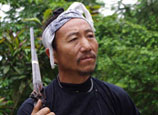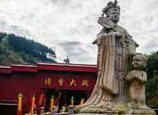
The land, utilities and infrastructure for the garden will be donated by the US government; the Chinese government will provide 22 structures, labor, landscaping and rockeries for the garden, which will be shipped to the US and assembled on site.
The Chinese design team, led by professor Peng Zhenhua of the Chinese Academy of Sciences, is working with the USDA and the National Garden Foundation to create a garden that will stay true to the classical Chinese garden style, while catering to Western audiences, Stallman says.
"One of our priorities and issues in design is the conflict between a traditional Chinese garden, and how the garden will actually be used," he says. He notes that Chinese gardens have traditionally been for private use by wealthy individuals.
"That's a natural conflict, but the trade-off is important because ultimately our goal is to have as many people as possible able to enjoy all the elements of a Chinese garden. We don't want an overwhelming Disneyland experience. We're really hoping to offer something more intimate."
A meeting between the Chinese design team and a US architecture firm is expected to take place in early July to coincide with the US-China Strategic and Economic Dialogue, Stallman says.
Although there are a number of other classical Chinese gardens in the US - at locations including the Metropolitan Museum of Art in New York; Overfelt Garden in San Jose, California; and Huntington Library in San Marino, California - Stallman believes that the National China Garden will be particularly noteworthy for its design elements, which are inspired by famous gardens in the cities of Suzhou and Yangzhou.
The garden will also offer cultural and educational programming, Stallman says. An on-site exhibition hall will also provide a venue for official visits and business events. Additionally, the National Arboretum will likely utilize the garden for some of its research on plant genetics.
"Chinese gardens are truly beautiful, and they create a different mindset that you don't get as much with US-style gardens," Stallman says. "Ultimately, we recognize that it's important for us to maintain the cultural links that create an atmosphere in which the US and China can collaborate as much as possible."

















 Shocking! Hairy stocking to beat sex harassment
Shocking! Hairy stocking to beat sex harassment


![]()
